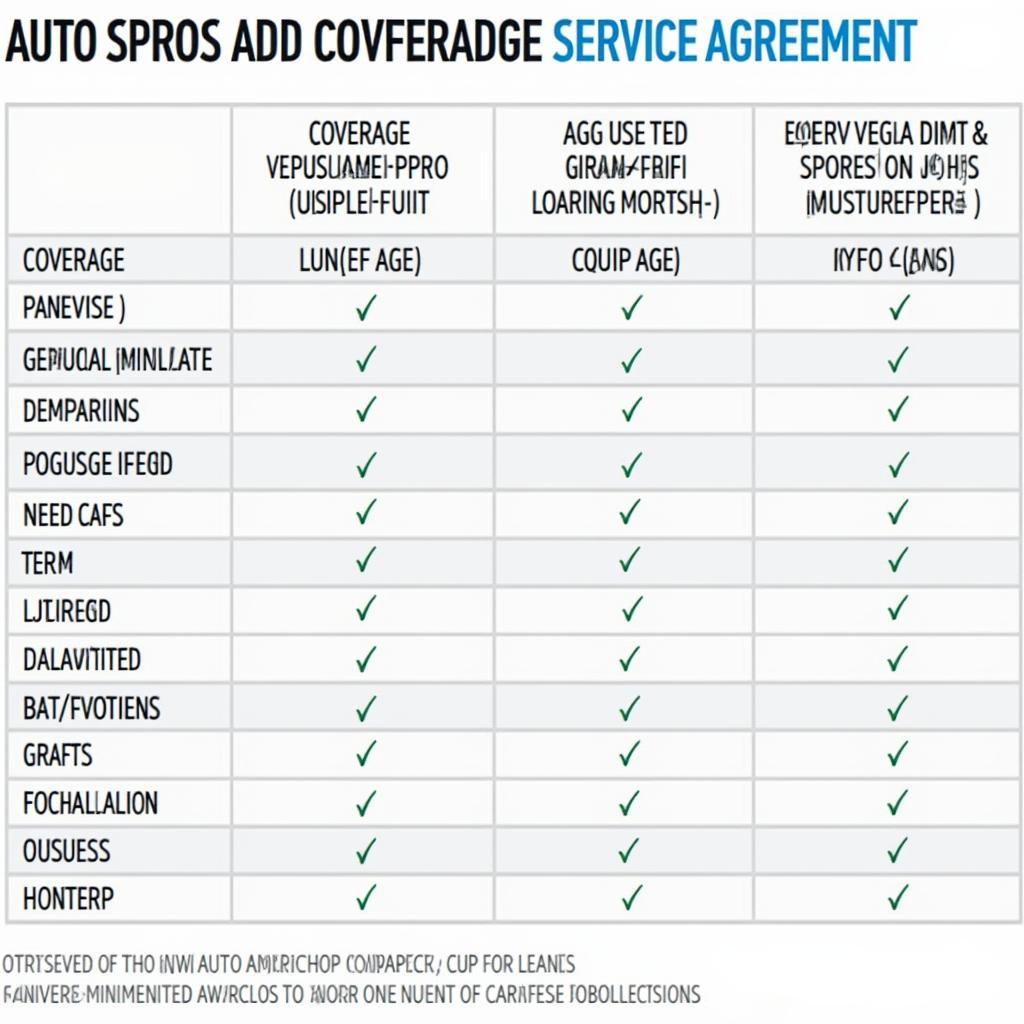Auto Service Agreements, often called extended warranties, can seem like an unnecessary expense, but they can save you a significant amount of money in the long run. This article will delve into the intricacies of auto service agreements, helping you decide whether this financial safety net is the right choice for your peace of mind and your wallet.
What Exactly is an Auto Service Agreement?
An auto service agreement is a contract between you and a provider (usually a dealership or a third-party company) that covers the cost of certain repairs after your manufacturer’s warranty expires. Think of it like an insurance policy for your car’s components, protecting you from unexpected and potentially costly repairs.
Types of Auto Service Agreements
Not all auto service agreements are created equal. It’s crucial to understand the different types available to choose the best fit for your needs and budget.
1. Powertrain Warranty
This type of agreement covers the most essential components of your vehicle’s powertrain, including the engine, transmission, and drive axles. It offers basic protection and is a good option for budget-conscious car owners.
2. Bumper-to-Bumper Warranty
As the name implies, this comprehensive warranty covers almost everything from the front bumper to the rear bumper, excluding routine maintenance like oil changes and tire rotations. It offers the most extensive coverage and is ideal for drivers seeking maximum peace of mind.
 Car Covered Bumper to Bumper
Car Covered Bumper to Bumper
3. Exclusionary Warranty
This type of warranty lists the specific components and repairs that are not covered. It offers broad protection, similar to a bumper-to-bumper warranty, but with specific exclusions.
4. Stated Component Warranty
This type of agreement covers a specific list of components or systems outlined in the contract. It offers a customized level of coverage and can be tailored to your specific needs and concerns.
What to Consider When Choosing an Auto Service Agreement
Choosing the right auto service agreement requires careful consideration of several factors:
- Coverage: Analyze the components and systems covered by the agreement and compare them to your car’s age, mileage, and potential repair costs.
- Deductible: Determine the amount you’ll need to pay out-of-pocket for each repair. A lower deductible typically comes with a higher premium.
- Term and Mileage Limits: Evaluate the length of coverage and the mileage limits. Consider your driving habits and choose a plan that aligns with your anticipated usage.
- Cost: Compare quotes from different providers to ensure you’re getting a competitive price for the coverage offered.
 Comparing Auto Service Agreements
Comparing Auto Service Agreements
Benefits of Having an Auto Service Agreement
Investing in an auto service agreement offers several advantages:
- Financial Protection: Protects you from the financial burden of unexpected and expensive repairs.
- Peace of Mind: Provides peace of mind knowing that you’re covered in case of a mechanical breakdown.
- Increased Resale Value: Can increase your vehicle’s resale value, making it more attractive to potential buyers.
Are Auto Service Agreements Worth It?
The value of an auto service agreement depends on your individual circumstances and risk tolerance. If you:
- Drive an older vehicle with a higher risk of repairs
- Want to avoid unexpected and potentially high repair costs
- Prefer the security and peace of mind that comes with coverage
Then an auto service agreement can be a valuable investment. However, if you:
- Drive a newer vehicle with a remaining manufacturer’s warranty
- Are comfortable with the risk of paying for repairs out-of-pocket
- Have a reliable emergency fund for unexpected expenses
Then you might decide to forgo an auto service agreement.
Tips for Getting the Most Out of Your Auto Service Agreement
- Read the fine print carefully and understand the terms and conditions.
- Keep all documentation, including the contract and receipts, organized and easily accessible.
- Follow the recommended maintenance schedule outlined in your owner’s manual to avoid voiding the agreement.
- Use a reputable repair facility authorized by the agreement provider.
Conclusion
Auto service agreements offer a safety net against the unpredictable costs of car repairs. By carefully considering your needs, budget, and risk tolerance, you can determine if an auto service agreement is the right choice for your peace of mind and financial well-being.
FAQ
1. Can I transfer my auto service agreement to a new owner if I sell my car?
Yes, most auto service agreements are transferable to a new owner, which can increase your car’s resale value.
2. Can I purchase an auto service agreement after I buy my car?
Yes, you can typically purchase an auto service agreement at any time before your manufacturer’s warranty expires.
3. What if I have a dispute with the repair facility or the agreement provider?
Most auto service agreements have a dispute resolution process outlined in the contract. Be sure to familiarize yourself with this process in case you need to utilize it.
4. Are routine maintenance services covered under an auto service agreement?
No, routine maintenance services like oil changes, tire rotations, and brake pad replacements are typically not covered under an auto service agreement.
5. Can I cancel my auto service agreement if I change my mind?
Yes, most auto service agreements have a cancellation period during which you can cancel the agreement for a full or partial refund.
Need Help Choosing the Right Auto Service Agreement?
Choosing the right auto service agreement can be complex. We’re here to help! Contact us via WhatsApp at +1(641)206-8880 or email us at [email protected]. Our team of experts is available 24/7 to answer your questions and provide personalized guidance.


